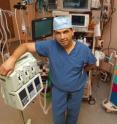Children's agitation after surgery may be preventable
Temporary combativeness after surgery—a complication affecting up to half of anesthetized children—may be preventable with drugs that decrease epinephrine production, according to a Medical College of Georgia pediatric anesthesiologist. "Some children wake up after surgery and begin crying and become combative," said Dr. Ivan Florentino, associate professor of anesthesiology and perioperative medicine and pediatrics at MCG. "They are often extremely frightened, disoriented and refuse to be comforted, even after being reunited with their parents. Some even hallucinate and become so agitated that they have to be restrained."
Those reactions, called emergence delirium, may result from a brain dysfunction that increases the release of hormones that prompt "fight-or-flight," a sympathetic nervous system reaction. The findings are being presented at the 50th Honduran National Congress of Anesthesiology Oct. 8-9.
Preschool-aged children and those with behavioral problems and developmental delays are more prone to emergence delirium because their sympathetic nervous system is often already hyperactive, Florentino said. "Some types of anesthesia increase the release of the stress hormone norepinephrine in the brain," he said.
Animal studies suggest traditional inhaled anesthetics are the most common culprits for emergence delirium. Newer drugs, such as those that bind to cells that release epinephrine, can reduce the incidence when given before or with anesthesia.
The disorder can create a challenge for parents and post-anesthesia care providers. Children can become so agitated that they pull out IVs and surgical drains, which can lead to complications such as increased bleeding at the surgical site, he said.
"Preventing this as much as possible is a way to improve children's experience with the operating room and anesthesia," Florentino said. "People used to be simply concerned about whether the patient woke up from surgery. Now the practice has shifted to focus on a better experience for the patients and their families."
Source: Medical College of Georgia
Other sources
- Children's agitation after surgery may be preventablefrom Science DailySun, 10 Oct 2010, 11:20:29 UTC
- Children's agitation after surgery may be preventablefrom PhysorgFri, 8 Oct 2010, 15:01:46 UTC
